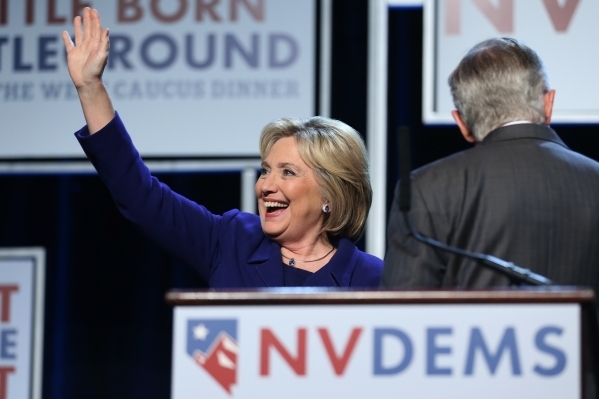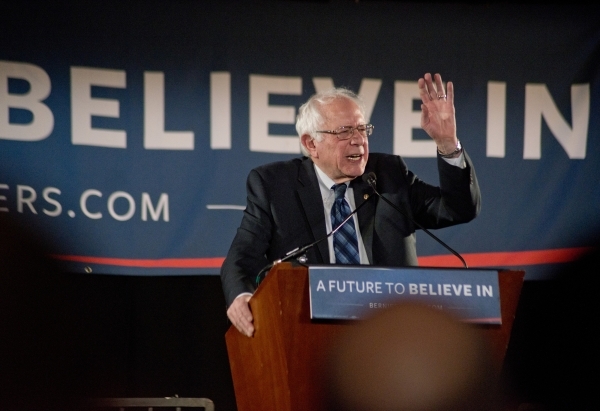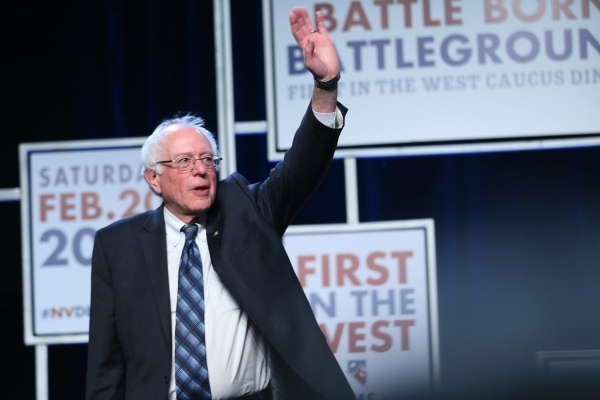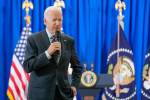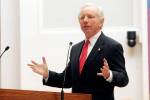Clinton, Sanders rift on full display at Nevada Democratic dinner
The contrast between Democratic presidential candidates Hillary Clinton and Bernie Sanders has been building for months. On Wednesday, it couldn't have been more clear.
As the candidates addressed the Battle Born/Battleground First in the West Caucus Dinner at the MGM Grand Conference Center, front-runner Clinton touted a pragmatic approach to politics, one less disturbing to Republican and corporate interests than the radical rhetoric of Sanders, her chief rival for the Democratic nomination.
Even a campaign video captured Clinton's caution: She wants to be the candidate for the struggling, the striving and the successful, she said.
Not only that, but she touted the fact that she was the only candidate on the stage (which they shared with former Maryland Gov. Martin O'Malley) who would not raise taxes on middle class families.
"I want to lower your taxes," she said.
Clinton took obvious shots at Sanders' agenda, which is much more expansive and expensive than her own. You can't raise middle-class wages by imposing higher taxes on the middle class, she said. We shouldn't raise taxes so that all students can get free public college or university tuition (including, she said, the children of Donald Trump!). And we should build upon the Affordable Care Act, not toss it out and build an entirely new, single-payer, Medicare-for-all system, as Sanders proposes.
And Clinton has the luxury of making those boasts, since her agenda — while certainly progressive — is something Sanders would consider very weak tea.
And that's precisely what he said.
No president, no matter how popular or talented, can take on the American political and economic system by himself or herself. That's why he's trying to fashion a broad cross-section of usually disaffected people into a "political revolution."
"We will not succeed unless we galvanize the American people," Sanders said. "I would not be running for president in my heart of hearts I did not believe it is just too late for establishment politics or establishment economics."
Establishment, by the way, should be read as a pejorative epithet in that formulation.
Sanders clearly believes — and the numbers are there to back him up — that Democrats win elections when turnout is high, when minorities and younger voters go to the polls. In order to get them to do that, Sanders said, they have to have a candidate they're excited to turn out to support. And Sanders points to noisy rallies all around the country where a septuagenarian senator from snowy Vermont has filled stadiums and gymnasiums with cheering throngs of all ages. (The Sanders crowd at Wednesday's dinner came equipped with loud, oft-employed noisemaking horns that seemed even to irritate Sanders himself at one point.)
In addition, Sanders agenda is undeniably bold: Single-payer Medicare-f0r-all universal health care. A $1 trillion infrastructure plan to create jobs. Breaking up big banks on Wall Street to prevent a repeat of the 2008 financial crisis. Free public college and university tuition. Voters will pay more in taxes (the Wall Street Journal has estimated the cost of his agenda at $15 trillion over 10 years). But they will get something for that money, and, if Sanders entire agenda were to be enacted, fundamentally change the American political and economic system for good.
A long shot? Undeniably. But, as Sanders explains: "When the people stand together, there is nothing that we cannot accomplish. And that is what this campaign is about."
But will it actually happen? Speaking at the Democratic debate in November, Clinton was confronted by quotations that appear to suggest she once supported a single-payer health care system during the early days of her husband's administration. Clinton didn't deny it. Instead, she said she was lonely in holding that view.
"The revolution never came," Clinton said. "I waited and I've got the scars to show for it."
Those scars — and decades of successfully navigating public life in American politics — have contributed mightily to Clinton's pragmatism. Sanders, by contrast, doesn't buy it, his own decades of frustrated advocating for change pushing him on in a final crusade.
On Wednesday, the differences between Clinton and Sanders couldn't have been more apparent.
— Steve Sebelius is a Las Vegas Review-Journal political columnist and co-host of the show "PoliticsNOW," airing at 5:30 p.m. Sundays on 8NewsNow. Follow him on Twitter (@SteveSebelius) or reach him at 702-387-5276 or ssebelius@reviewjournal.com.



